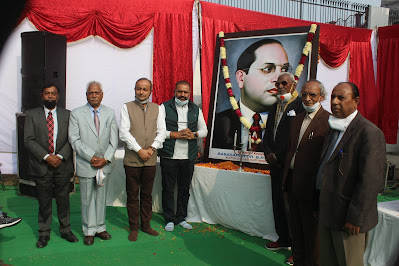Punjab Civil Society
“No fundamental social change occurs merely because government acts. It's because civil society, the conscience of a country, begins to rise up and demand - demand - demand change.” It is a quote from the President Elect Joe Biden of the USA, the oldest and vibrant democracy of the world. Taking a cue from this, we, some of the residents of Jalandhar and its periphery, decided last week, on December 18 to float an outfit, Punjab Civil Society, to discuss and brain storm matters of interest and concern to Punjab and the society at
large as stake holders in the development and progress of the society. It seems, some of us namely; Community Activists Sanjay Kumar, Rakesh Shantidoot, Raman Kumar among others did the necessary ground work in this regard. My association with this endeavor started recently with my meeting with Sanjay Kumar of Delhi followed by an informal meeting of likeminded fellow citizens on a chili afternoon on December 17 at the spacious home of Raman Kumar which was attended by MLA Pargat Singh, Principal Navjot Kaur, Col. Balbir Singh, Dr. Nachattar Singh, Ravinder Dhir among others, besides initiators of the idea Sanjay Kumar and Rakesh Shantidoot. It was agreed to float Punjab Civil Society as a safety valve in the process of political and socio-economic development of our country. The current issue of the farmer’s agitation – Kisan Andolan was discussed and it was decided to support the just cause of farmers and ward of the possibilities of the situation going out of hand. It was also decided to announce the formation of Punjab Civil Society and give our views and extend support to the ongoing farmer’s agitation over an interaction with media. With this introduction, it will not be fair on my part if I don’t add a line, with a sense of gratitude, to thank our hosts for hot Amla-Honey concoction and Masala tea with assorted dry nuts and other savories to beat the seasonal chill at the cozy home of Raman Kumar.
Accordingly, we met at the Training Institute of Co-operative Bank in the heart of Jalandhar, the venue kindly offered gratis by the Director of the Institute, Dr. Nachattar Singh. It was gratifying to note that it was a well attended meeting represented by cross sections of the civil society and media. Rakesh Shantidoot set the ball rolling by his opening statement giving the purpose and agenda of Punjab Civil Society and also his views on the Kisan Andolan followed by
brief interventions, inter alia, by Ambassador Ramesh Chander, Col. Balbir Singh, Principal Navjot Singh, Ravinder Dhir, MLA Pargat Singh, Raman Kumar. The meeting turned out to be, as expected, a productive and informative interaction with media. Prominent media personalities like Major Singh, I.P. Singh, Surinder Paul among others welcomed and appreciated the newly floated outfit Punjab Civil Society and gave an overview of the prevailing political and socio-economic situation in the country with particular reference to the ongoing Kisan Andolan. In a handout issued at the meeting, Punjab Civil Society appealed to all Punjabis to come forward to serve and save Punjab and give it a right direction, with their active participation, to come out of the existing difficult situation.
I conclude here with the hope that Punjab Civil Society would succeed in doing its intended work to bring about peace and harmony in the society. My initial interaction with some of the highly placed members of the Society has generated very positive vibrations, I must add. I was reminded of Martin Luther King Junior who said and I quote, "Our lives begin to end the day we become silent about things that matter”
ਆਗਾਜ ਤੋਂ ਅੱਛਾ ਹੈ; ਅੰਜਾਮ ਖੁਦਾ ਜਾਣੇ !
























